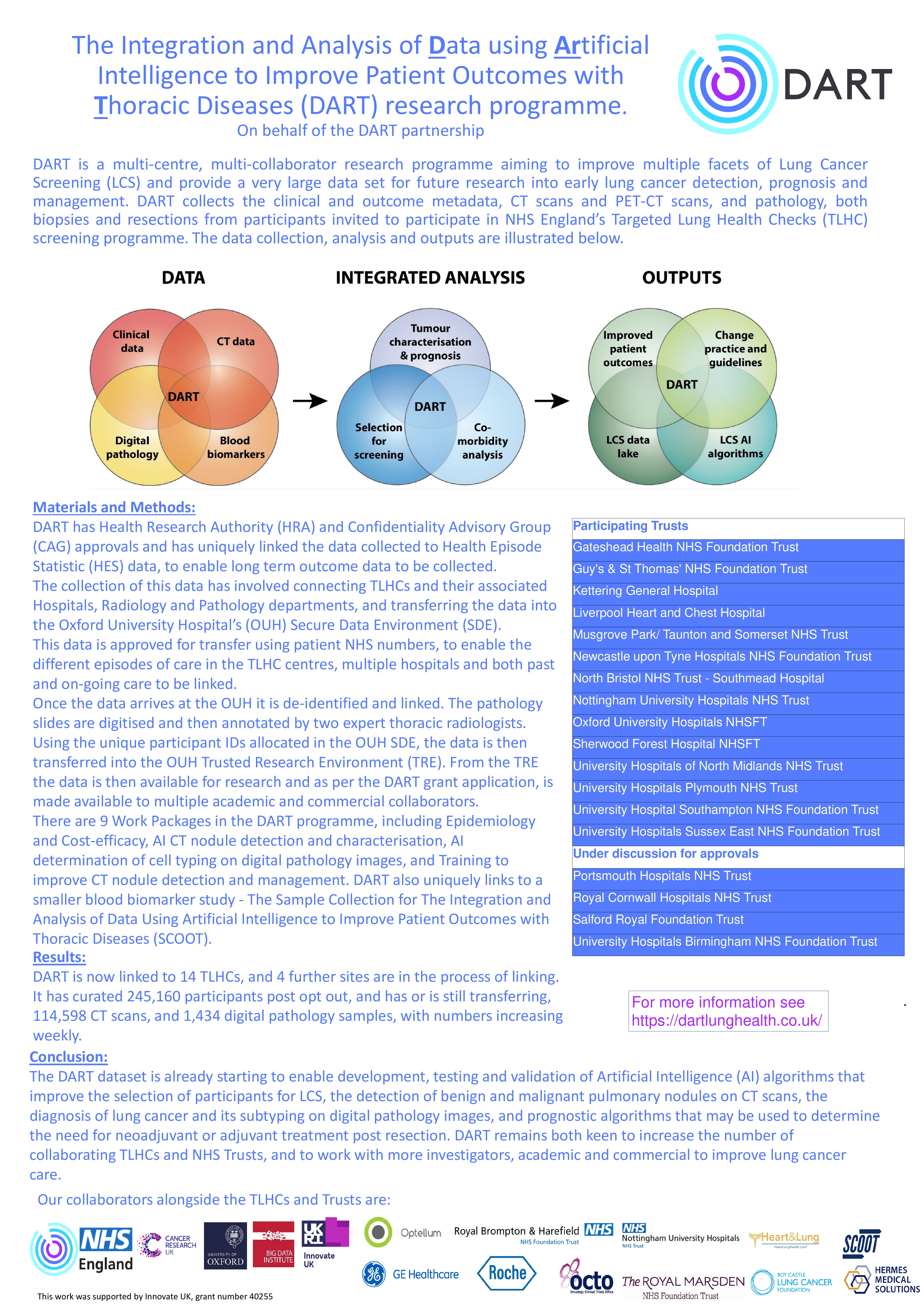Patients
Information for patients, downloadable information sheets and a link to FAQs.
Those attending the Lung Health Check programme are also being invited to join a research study running alongside and in parallel with the Lung Health Checks. It is structured so as to allow the NHS to continue to provide health care, while also gathering information (data) to help improve the diagnosis and treatment of lung disease in the future.
Oxford University is leading the project to improve the diagnosis of lung cancer called “The Integration and Analysis of Data using Artificial Intelligence to Improve Patient Outcomes with Thoracic Diseases”, commonly known as DART.
To aid our research, it is important to gather data from as many people attending Lung Health Checks as possible. However, if you do not want your data included, now or at any time, please tell us using the contact details below.
You may also be asked to join another project, SCOOT, which will be collecting blood samples to further improve diagnosis of lung disease. More information is provided below.
DART is a registered project with the Integrated Research Application System, IRAS 301420.
A summary of the study is available from the ISRCTN Registry, ID ISRCTN13720905 and on the CRUK website here.
Your role
Your data will be gathered during your lung health check or follow on appointments. It will not require any extra time or visits and will not interfere with the health care you are already receiving. You will be assisting researchers to diagnose lung cancer earlier and save lives.
Your personal information will be given a code, keeping it private but enabling an NHS research laboratory to link your data (health records, scans, biopsies and resections) accurately.
We will de-identify your data before it is used by researchers so there is no link back to you and you will never be identified in research or publications.
What the research hopes to achieve
- Use computers (artificial intelligence) to:
- identify nodules that are not cancers and are harmless
- speed up the time to diagnose early lung stage lung cancer
- remove the need for other investigations such as lung biopsies in some patients
- make investigating patients for suspected lung cancer safer
- allow the NHS to reach more people for Lung Health Checks
- ultimately save lives
Why this is important
- If found at an early stage, lung cancer is curable
- Therefore, early detection and treatment of asymptomatic patients is crucial
- CT scans detect small nodules which could be early stage cancer
- Once a nodule is detected on CT, it is critical to determine if it is benign, as the vast majority of nodules detected on CT are not due to cancer
- Additional tests and biopsies to identify cancer cause great patient anxiety, take time and are expensive so DART aims to improve their accuracy
- DART aims to develop an Artificial Intelligence software programme that is faster and more accurate than doctors to interpret CT scans and detect cancer
- This will speed up the time to diagnosis and reduce the numbers of additional scans and biopsies that might be needed in future.
- Our greatest aim is to see if having a scan via a Lung Health Check centre can reduce the need for any additional tests, so patients showing signs of cancer are treated more quickly
- We need to gather and analyse data from the majority of people who have a scan which shows they do not have cancer, as well as from the few whose early cancer can be picked up and treated
- As smoking can cause heart disease, patients screened for lung cancer often have heart disease, and we aim to use AI to see if we can identify this from their CT scans as well.
Your data will be kept safe and secure. It will only be used in accordance with General Data Protection Regulation (GDPR) standards for data privacy.
Further information
If you do not want your data included in the project, please tell your Lung Health Check or email ouh-tr.dart@nhs.net.
This study has been reviewed and approved by the West Midlands Black Country Research Ethics Committee, reference 21/WM/0278.
We have special permission to conduct the DART study without study-specific consent (i.e. link, transfer, process and analyse the data) from the Confidential Advisory Group under Section 251 of the National Health Service Act 2006 and its current regulations, the Health Service (Control of Patient Information Regulations 2002) (CAG reference number: 22/CAG/0010).
We answer some frequently asked questions below. We would like to highlight that participation is completely voluntary and participants can choose not to share their data or can withdraw at any time.
Downloadable documents
DART information sheet (one page)
DART Privacy Notice and longer information sheet (four pages)
The SCOOT Project
SCOOT is the Sample Collection for the Integration and Analysis of Data using Artificial Intelligence to Improve Patient Outcomes with Thoracic Diseases. It is tasked with collecting blood samples for DART researchers.
SCOOT draft information leaflet
Frequently Asked Questions (FAQs)
Latest
See all latestImportant: DART Programme Data Email Address Update
March 17, 2025
Thank you to all the sites which are sending data to the DART Programme. Please note that our email address…
Update on the NHS Lung Cancer Screening Programme
March 4, 2025

DART at OxCODE
January 29, 2025
Active data enrichment by learning what to annotate in digital pathology
March 11, 2024